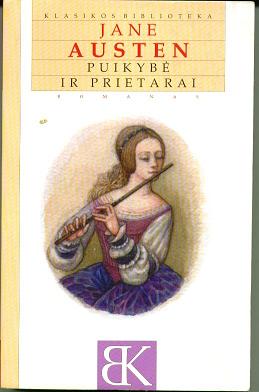 Don’t worry, this is still Risky Regencies and you have not been transported to some strange country.
Don’t worry, this is still Risky Regencies and you have not been transported to some strange country.
Or only a bit strange—they have, at least, heard of Jane Austen. They even quite cleverly translated the title to keep the alliteration. This is Pride and Prejudice, a copy my mother brought back from her twice-annual trip to Lithuania.
Both my parents emigrated from Lithuania as children. Though I was born in the U.S., my first language was Lithuanian. In fact, I went to kindergarten knowing very little English. Perhaps not the smoothest way to integrate a child into a “new” country, but somehow I managed. I know that growing up bilingual has made other languages (perhaps even computer languages) easier. Still, I sometimes wonder if I can blame my occasional awkwardness with word choices and phrasing on this early linguistic confusion. Or maybe not. Maybe I’m just the Queen of Awkward Sentences, doomed to seemingly eternal revisions. 🙂
Anyway, I find this book and its packaging quite interesting. Though the title is clever the cover art is many centuries off. One would think they could have found something more appropriate. At least it’s not Victorian!
I read the back blurb, and was surprised to see that they gave the entire plot in a nutshell, spoilers and all. If, that is, there is such a thing as a spoiler for a book that’s been around since 1813.
Overall, it makes me happy people all over the globe can enjoy Jane’s genius. I wonder how she would feel about seeing her works in so many translations? Have any of you run across any other interesting translations? What have your experiences been with foreign languages? How do they affect your reading and writing?
Elena, hoping someday there will be Lithuanian editions of her own works
www.elenagreene.com
LADY DEARING’S MASQUERADE, an RT Reviewers’ Choice Award nominee

Elena:
Wow, I am so impressed with your multi-language skills! You and Joseph Conrad, right?
I’ve got no translation anecdotes, but I took many years of French and two intense years of Latin, both of which help my Eglish quite a lot. I find the Latin especially helpful, and when I’m older and have more time, am going to revisit my study of that language.
I really like that cover even though it doesn’t reflect anything about the story or the time period. I guess they took care of that on the back cover.
I am bi-lingual in Italian. My parents brought me here when I was two months old. It is not my first language but when I am in Italy or around my relatives for an extended period of time I find myself thinking in that language first.
My older brother went to kindergarten with more Italian than English, as he was three when we came here. It was a bit of a stumbling block for him those first years.
I find the acquisition of language and speech to be fascinating.
Foreign translations are so interesting! In my own books, I’ve seen a couple of German translations where the titles somehow became immensely long and complex. And a friend, who writes Elizabethan-set books, got a Korean version of one of hers. The cover was fascinatingly strange–a girl in what appeared to be a 1970s pale pink prom dress and big, floppy hat, with Neuchwanstein (sp?) Castle in the background! 🙂
I like that cover too, Santa! Just on its own merits. Not the right period, but charming nonetheless.
I would adore for my book to be translated into another language. I have my fingers crossed that Cora will do a German version, and I can get some friends to translate bits for me!
Cara
I have always envied people who grow up speaking more than one language–in large part because learning languages (especially as an adult) is so darned hard! Though I am proud to say that I can say “I don’t speak French” (or German, or Italian, or…) in any number of languages. 🙂
Another disincentive is that whenever I go abroad, the people there inevitably speak English far better than I speak whatever the local language is. So when I try to speak the native tongue, I’m actually impeding communication more than I’m helping it. C’est la vie!
Todd-who-kein-deutsches-spricht